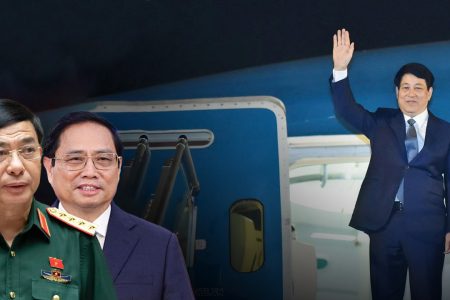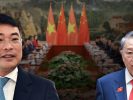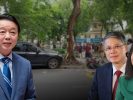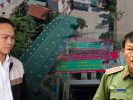
President Trump, President elected Biden and policy towards China
Since winning more than 270 electoral votes, President-elect Joe Biden has contacted leaders of allied countries, pledging to mend partnerships that have been dented over the past few years, and reasserted the US’s commitment to mutual security agreements which have been questioned under President Trump.
During the four years of President Trump’s leadership, America’s allies in the region have been anxious about whether the unpredictable American leader will honor America’s commitments.
After reassuring European leaders that „America is back,“ Mr. Biden telephoned Australian Prime Minister Scott Morrison, South Korean President Moon Jae-in, and Japanese Prime Minister Yoshihide Suga. The three leaders called to congratulate him, even though President Trump has not yet recognized his defeat.
Japanese officials said during the phone call, Prime Minister Suga warned of „the security situation around the area is getting worse and worse.“ In response, President-elect Joe Biden reaffirmed „the US‘ commitment to protecting Japan,“ to carry out the US obligations under the security agreement signed decades ago, the transitional committee of Biden said.
In a move that is likely to cause outrage in Beijing, Biden affirmed the US security commitment spanning the Senkakus Islands, an uninhabited archipelago that both Japan and China claim to belong to them.
In a private phone call with South Korean President Moon Jae-in, Mr. Biden described the US-Korea alliance as the „foundation of security and prosperity“ in the region, and he pledged to work together to resolve the “common challenges,” especially North Korea, and climate change.
Meanwhile, President Trump has repeatedly said he is considering a solution to withdraw troops from Japan and South Korea, where more than 20,000 US military personnel and equipment are stationed, whose purpose is to deter a military attack from the North.
South Korea’s presidential office said Mr. Moon and Mr. Biden agreed to meet „as soon as possible“ after the inauguration.
In a phone call with the Australian Prime Minister, Mr. Biden was invited by Prime Minister Scott Morrison to visit Australia next year to mark the 70 years of the Australian-US security agreement.
Mr. Biden noted the importance of „coping with climate change“ which the conservative government of Australia does not seem to place a high priority on, despite the country signing the Paris Agreement on climate change.
The Australian Prime Minister described the phone call between the two leaders as „warm.“
As a member of the US Senate Foreign Relations Committee for decades, Mr. Biden has visited many countries and met with leaders from around the world.
As US vice president under Obama, Mr. Biden has put a lot of effort to promote the US as a „power in the Pacific.“
The rest of the countries reached a TPP agreement without the US
But after Obama’s presidency ended, his pivot to Asia policy, and persistent efforts to build a coalition at regional conferences such as ASEAN, APEC, and summits East Asia … has been replaced by a pragmatic relationship. President Trump also withdrew from the Trans-Pacific Partnership (TPP) which was reached after eight years of tough negotiations and aimed at isolating China economically, paving the way for Beijing to lobby for the Regional Comprehensive Economic Partnership (RCEP) without the US, which was signed a few days ago.
President Trump also raised concerns for allies in Asia as he repeatedly escalated trade disputes with China, moved closer to North Korea’s dictator Kim Jong Un, and openly discussed the possibility of the US withdraw troops from the area.
“Joe Biden will be tough on China too, no less than President Trump”
The website Intellasia quoted Wu Shicun, head of the National Research Institute for the South China Sea, as saying that Mr. Biden „will take a different approach from President Donald Trump.“
„Mr. Biden will pay more attention to the South China Sea issue, but his policies are more balanced and more restrained.“
Patrols have begun under President Obama but have become more frequent under President Trump as the US leader delegates more powers to the Pentagon to flexibly plan the conduct of its naval patrols to assert freedom of movement in disputed waters. Mr. Wu predicts patrols to assert such freedom of navigation will be less frequent under a Biden government, as patrols affect bilateral relations and increase US-Chian tensions.
For China, Beijing expects relations with Washington under Biden to be more stable, more predictable, and not as erratic and abrupt as with Trump, however, relations with Washington will not change significantly, on a number of important issues. The Financial Times quoted Chinese government analysts and advisers as saying:
„There will be no significant change under Mr. Biden on thorny issues such as Taiwan, Hong Kong, South China Sea (East Sea), Xinjiang, Tibet, and the religious and human rights situation,“ said Shi Hong, professor of Renmin University in Beijing and advisor to the State Council on foreign affairs. “But Mr. Biden’s temperament is not as erratic as Mr. Trump, he is more polite, more predictable, helps stabilize Washington’s policy toward China.”
The Financial Times quoted an American affairs expert at the Beijing Academy of Social Sciences, Mr. Lu Xiang, explaining the difference between the two American leaders:
“Biden sees China as a competitor, while Mr. Trump sees China as a rival. The relations between the two competing countries are based on rules and regulations.”
South China Sea Issue
Dr. Le Hong Hiep of the Institute for Southeast Asian Studies (ISEAS) in Singapore said that the composition of the staff chosen by Mr. Biden to key positions in the Ministry of Defense will affect relations with Beijing in the South China Sea, but whoever they are, Dr. Hiep added, „regional tensions are unlikely to disappear overnight.“
Among those promising to be selected to lead the Department of Defense is Michele Flournoy, who served as deputy defense secretary for policy under President Obama. She is an advocate to be tough with China.
“The South China Sea has become an important battleground for a strategic confrontation between the US and China, where the US can mobilize regional countries against Beijing, and use sovereignty claims too ambitious of China to rally allies.”
Dr. Hiep stated:
„So under Biden governance, the US and its allies are likely to continue to maintain, and even strengthen, their presence in the South China Sea.“
At an online meeting with the Association of Southeast Asian Nations on Thursday, Chinese Premier Li Keqiang said strengthening ties with the 10 ASEAN countries was one of Beijing’s priorities. Mr. Li called for accelerating negotiations on a Code of Conduct (COC) in the South China Sea. He suggested a 3-year period to create that ruleset.
Mr. Wu says Washington’s policy rejects most of Beijing’s sovereignty claims in the South China Sea, political turmoil in Malaysia, changes in leadership at the highest levels that could happen in Vietnam and in the Philippines in the next 2 years could further complicate the negotiation process.
Dr. Le Hong Hiep said that despite these obstacles, Beijing is still anxious to complete a Code of Conduct in the South China Sea. Deepening the US-China hostility could encourage China to speed up the negotiation process,” he said.
“On the other hand, it could cause Washington to increase support for countries to resist China’s claims, like eliminating countries outsiders (like the US), to ban military exercises or economic activities in the South China Sea.”
The South China Morning Post quoted experts saying a Joe Biden government was probably as tough as the Donald Trump administration over disagreements between Washington and Beijing such as the South China Sea issue.
The newspaper quoted Professor Jay Batongbacal, Director of the Institute of Maritime Law and the University of the Philippines, said: “Considering Mr. Biden’s process as a senior legislator, we will see an increase in multi-cooperation to increase the pressure to solve problems globally.”
Southeast Asia expert, Professor Carl Thayer of the University of New South Wales, says that under President Biden, countries in the region will be under less pressure to choose sides between US-China tensions.
Professor Thayer said the US-Japan-Korea alliance will be less confrontational and more harmonious under a Biden government. On the other hand, Professor Thayer notes that President-elect Joe Biden’s stance toward China has become tougher over the past decade. Mr. Biden places more emphasis on human rights in bilateral relations. During the campaign, Mr. Biden has lashed out at Beijing’s actions in Hong Kong, describing China’s policy towards Muslim minorities in Xinjiang as „unscrupulous,“ and also calling Xi Jinping is a „thug“ in a debate with candidate Bernie Sanders in February this year.
„He (Xi) is a thug, in fact, he pushed one million Uighurs into re-education camps, which means concentration camps.“
Mr. Biden said that once he told Xi directly that the US would challenge China’s „no-fly zone“ in the South China Sea, declaring: „We will send B-1 bombers over the no-flying area,” and he added:“ We will make it clear, very clear, that all parties must comply with the general rules!”
In the early stages, however, relations with China were not the number one priority for the new Biden government. An anonymous Chinese analyst told FT:
“In the current context, the immediate problems facing the new Biden government are domestic problems, starting with an effort to cope with the Covid-19 epidemic, followed by economic and infrastructure problems. But once these issues settle down, relations with Beijing will be raised to the top priority.”
Thoibao.de (Translated)


























